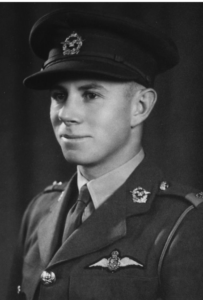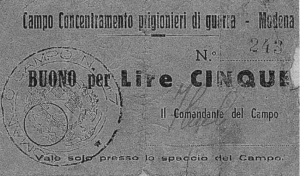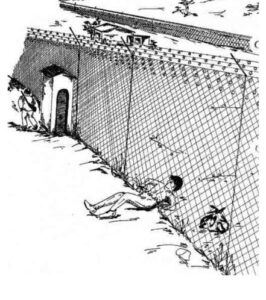Jeffery Morphew
(1918-1994)
Pilot South African Air Force
Eventually, I decided the only way to stop them strafing me was to feign death. I lay on the ground. Within seconds, a 109 came at me broadside on. I watched it approach just above ground level, expecting the blast of fire which would take me out of this world. The 109s stopped their strafing immediately, broke off the engagement and flew off […]. When I eventually stood up, I found that my left arm and side were a mess of blood and dirt. My right arm was also covered with flecks of blood from the flying gravel.
[…] The rest of the day was characterised by terrific heat, thirst, fatigue and pain. I have never felt so lonely and desolate.
In the late afternoon, while he was marching in the desert heading east, tired, wounded, and weakened by the blood loss, he was approached by two Italian soldiers on a motorcycle. Jeffrey did not resist and was captured. He was taken to Derna and spent a few days at the local military hospital three miles outside the city. Hygienic conditions were terrible; flies buzzed around the patients and their wounds, and there were no anaesthetics.
On 9 June 1942, Jeffrey was transferred to the ship Aquilea and taken to Naples with other PoWs. He then arrived by ambulance at the Caserta military hospital.
Alongside the main building at Caserta Hospital, on the side farthest from the road, was a tall tree. It towered up just outside our window and immediately made me think of escaping.
Nearly all the cases there were bad ones, such as fellows with missing limbs and so on. The wards were not all crowded, and the beds were normal hospital beds. Most of the doctors were British and were told all the medical supplies came from the Swiss Red Cross.
On 19 June, most of the PoWs in the hospital were transferred to the Lucca military hospital. This journey was extremely tiring for Jeffrey, who reached Lucca exhausted and feverish.
At Caserta, we had lived on a semi-starvation diet, which consisted mainly of “grass soup”. Conditions were not much better at Lucca. Nevertheless, my recovery began there, and even before I was sent to my first POW camp at Chieti, on the Adriatic coast, east of Rome, thoughts of escape help had begun to ferment like yeast in my mind […].
Once in Chieti (it was now August), Jeffrey was relieved to discover that many PoWs in the camp were South Africans. However, his stay in the camp lasted only a few months, as he and his compatriots were soon transferred to another camp. He quickly decided to jump from the moving train. He shared his plan with another PoW, Cecil Koelges, who agreed to help. However, the scheme ultimately failed: during the transfer, the guards constantly watched the two and they were unable to move. Someone (Jeffrey suspected an English officer housed in their hut) had probably informed the Italians of their plan.
Moving from Chieti to Modena in November 1942 meant, of course, that we went to a much colder part of Italy at that time when winter was fast approaching. Chieti was in a hilly country to the south, relatively sheltered from the cold winds, whereas Modena, on the plains of Lombardy, was exposed to the winds that blow from the Alps. We South Africans suffered greatly from the cold. The move did mean, however, that I would be much nearer to the country of my dreams –Switzerland.

Jeff in March 1939 (Source: J.Morphew, Five frontiers)
Jeffrey recalled that PG 47 Modena housed South African and New Zealander PoWs. Soon after his arrival, he enthusiastically participated in the publication of the camp’s newspaper, the Central News Agency, which at least allowed him to fight the boredom and remain constantly informed about what was going on outside.
After two fellow PoWs bravely attempted to escape the camp (they were quickly recaptured), the prisoners formed an “escape committee”. PoWs who wanted to escape were supposed to refer their plan to the committee for approval. If the committee judged the plan feasible, all prisoners were to help the escapees enact their plan. In Jeffrey’s sector, the officer in charge of liaising with the committee was Bob Meintjes, a prisoner Jeffrey knew he could trust.
Since he was allowed to walk around the camp’s perimeter daily, Jeffrey started observing the place closely and imagining ways to escape. He decided, as a starting point, that he had to act at sunset before the changing of the guard. He noticed, moreover, that the only external personnel allowed in the camp were the Carabinieri. Therefore, he planned to impersonate a Carabiniere and walk out of the camp.
I began to study the Carabs, their movements about the camp, their posture and mannerisms. The grey-green uniform and forage cap lent to me at Lucca were still hidden among my blankets, but making the five-pointed silver stars and lapel badge posed a problem. An even more serious one was to find a companion (because the Carabs worked in pairs) who would also have to be prepared to be summarily shot if caught in enemy uniform..[1].
Once he was set on his plan, he found a companion – Cecil Koelges, South Africa Artillery – and shared his scheme with Bob Meintjes. The committee approved the plan, and Jeffrey received their help in enacting it. In particular, they help him forge the fake uniforms he and his companion need to achieve their goal.
On 3 March 1943, Jeffrey and Cecil donned their uniforms above some civilian clothes. They walked to the gates, pretending to be Carabinieri at the end of their shift.
Before I knew what was happening, Cecil was ordering the sentry: “Apri il cancello” [“Open the gate”] in perfect Italian. The guard proceeded to unlock it without hesitation. The gate creaked open, and we strolled through.

Camp’s banknote in Modena (Surce: J.Morphew, Five frontiers)
They walked nonchalantly to a secluded corner and, with some difficulties, climbed the fence once the guards patrolling the perimeter turned the corner. Once outside, they disappeared into the darkness and started marching across the surrounding countryside. Only once they reached a safe distance did they discard their fake uniforms.
At this point, their plan was to reach Modena’s train station and catch a train to Milan, hiding in the crowd of Italians. Once in Milan, they took another train, this time to Como. However, in the confusion during a stop on the way, Jeffrey and Cecil lost sight of each other. The following day, Jeffrey came back multiple times to the station in Como, hoping to find his companion, but in vain.
Therefore, Jeffrey decided to reach Chiasso alone, to cross the border with Switzerland. He did not have a map (as Cecil had theirs). Moreover, he could not speak Italian and thus pretended to be deaf and mute when people approached him on the road.

Drawing of Jeff crawling under the Italian fence (Source: J.Morphew, Five frontiers)
When he finally reached the Swiss border, he realised he had to climb a double fence guarded by barbed wire. In addition to the wire, on the Italian side, bells were placed at the top of the fence to alert the guards. Moreover, between the two fences, there was a building, probably used by the workers of the nearby railway.
Crossing the border, thus, was no small feat. Nonetheless, Jeffrey managed to open a small hole in the Italian fence and, naked, slipped through to the other side. «The sharp corners of metal pressed painfully into my flesh, but after a long and difficult struggle, I got through, bleeding from many cuts and abrasions». He now had to cross the middle field without being spotted. Luckily, as he was crossing, a train passed on the railway. The smoke and the noise of the locomotive allowed Jeffrey to move unseen until he reached the second fence, which he climbed without much difficulty. It was the night between 7 and 8 March 1943.
I looked at my watch. The time was 23.30, five and a half hours since I had arrived at the Italian wire. I will never know how much adrenaline was manufactured in my body during that time!
Once in Switzerland, however, Jeffrey decided he wanted to continue to fight in the war, as it was his duty to go back, even though in Losanna, he had met a girl, Joyce, whom he married the following year. After a while, he crossed the border with German-occupied France and then reached Gibraltar through Spain, subsequently landing in London in January 1944. He returned to South Africa only in April 1945.
At the end of the war, Jeffrey was awarded an MBE for his brave escape and his determination to return to serve in the army.
Camps related to this story
Sources
J. Morphew, Five frontiers to freedom, National Books Printer, 1999, Cape Town
Notes:
[1] Cecil Koelges was recaptured in Chiasso and later transferred to Germany. Jeffrey never learned why he decided to disappear during their escape.
